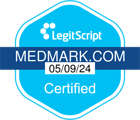Start Opioid Use Treatment in Columbus North, Georgia
At MedMark Columbus North, we are aware of the struggle of opioid addiction and are here to help you. Our outpatient treatment programs (OTP) are specifically designed to meet your needs and help you overcome your addiction to fentanyl, heroin, prescription drugs, or any other type of opioid.
We are your partners in this journey and are committed to helping you achieve a more fulfilling life.
Medication-Assisted Treatment at MedMark Columbus North
At MedMark Columbus North, we are here to help you on your journey to recover from opioid addiction. We offer medication-assisted treatment (MAT) which includes taking methadone as an option for treatment.
Methadone is a type of medication that has been used for over forty years to help with opioid addiction. It works by connecting to your brain receptors and reducing withdrawal symptoms and cravings.
Taking methadone as prescribed can help you stay away from opioids and focus on the other important things that will help you have a successful recovery.
MedMark in Columbus North offers help to those dealing with opioid addiction. We have a special program called MAT that uses buprenorphine.
This medication works by binding to the same receptors as other opioids, but with less of a risk of being misused. Buprenorphine helps reduce cravings and withdrawal symptoms, so people can concentrate on healing the mind and heart.
Additionally, we provide counseling and support to make sure those struggling with opioid addiction can have the best chance of a successful recovery and a happy life.
Substance Use Counseling for Columbus North, GA
At MedMark Columbus North, our counselors are here to help you. In our individual counseling sessions, we can give you helpful tips so you can stay on track and keep you from relapsing.
We’ll also talk about your feelings and help fix any relationships that may have been hurt by your addiction. We want to help you make a plan so you can reach your goals and stay on the right path.
We know how hard it can be to struggle with opioid use disorder. That’s why we provide group counseling, so you can get the support they need.
When you talk to others who understand what you’re going through, it can give you the strength to stay on track with your goals. Group counseling can also help you learn skills to manage any roadblocks you may face.
Most importantly, it’s a place to give and receive encouragement and support, so you can stay on the path to wellness.
Support Services at MedMark Columbus North
- Medical assessments and testing
- Case management services
- Coordinated pregnancy treatment
- Addiction and relapse prevention education
- Referrals to community resources
- Discharge planning and support
- Guest medication services
Learn more about how these services can ensure you are taken care of as whole person.
Your Next Step for Addiction Treatment at MedMark Columbus North
If you are ready to start your journey toward recovery, we recommend scheduling an appointment ahead of time, as it will last up to three hours.
To get started, call or email us for more information. We are here to provide you with a compassionate, supportive environment as you take the necessary steps to a healthier future.



